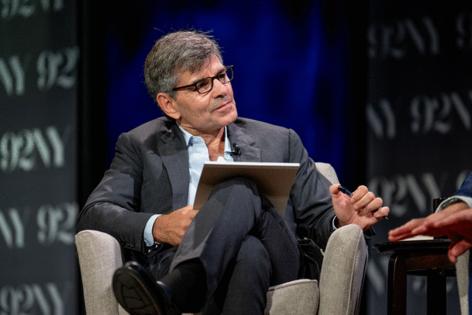Noah Feldman: ABC's decision to settle Trump's defamation suit makes sense
Published in Op Eds
Donald Trump loves to sue people for defamation to scare them out of making negative statements about him. In a settlement made public Saturday, ABC News agreed to pay $15 million to settle a lawsuit by Trump, arguing that he was defamed when anchor George Stephanopoulos said the president-elect had been found liable in court for raping writer E. Jean Carroll.
The money will be donated to Trump’s future presidential foundation and museum. The company will also pay Trump an additional $1 million for his legal fees.
That sounds bad, and indeed ABC has been criticized for failing to stand up to Trump the way a news organization should. As with most things Trump, the stakes of the debate are much bigger than the man himself. They go to the future of free speech and a free press in America.
To decide whether you think this criticism is legitimate, you need to understand two things: the legal rule for defamation of a public figure like Trump, and the technical details of the jury’s findings about what Trump did to Carroll in the 1990s.
Defamation of a public figure is governed by a landmark 1964 Supreme Court decision, New York Times v. Sullivan. The basic idea is that in a defamation suit by a private citizen, the plaintiff must prove the statement was defamatory and false. In a suit by a public figure, the plaintiff must show the statement was defamatory — but also that it was made with knowledge that it was false or else with reckless disregard for its falsehood. The result is that it is substantially harder for a public figure to prove libel.
The reason for this difference is the protection of the press. The Supreme Court wanted to make sure public figures don’t chill the press from reporting the news by threatening them with libel suits. Yet the Sullivan rule has been under criticism in recent years from justices Clarence Thomas and Neil Gorsuch, who think that public figures are getting too much criticism in the era of social media, clicks, and “citizen journalists.”
For Trump to win his lawsuit against ABC, he would have had to prove that Stephanopoulos knew or should have known it was false to say that Trump was found liable for rape.
Here, things get a bit complicated. Technically, the jury found that Carroll had proved to a preponderance of the evidence that Trump sexually abused her. The jury declined to find that he had raped her under New York law, which defines rape as requiring penetration by the penis. If Stephanopoulos’ statement is taken as a statement of the jury’s formal finding, it was false.
The tricky part is that New York’s definition of rape is unusually narrow. As District Court Judge Lewis Kaplan subsequently explained, “the definition of rape in the New York Penal Law is far narrower than the meaning of ‘rape’ in common modern parlance, its definition in some dictionaries, in some federal and state criminal statutes, and elsewhere,” where digital penetration would count. ABC, therefore, could have argued in court that Stephanopoulos didn’t speak falsely at all, so long as he wasn’t referring to New York law but was using the word “rape” in its more general meaning. Judge Kaplan’s statement would have helped this defense.
Then there’s the public-figure-specific element: whether Stephanopoulos knew or should have known the statement was technically false as a matter of New York law. ABC could have argued that Stephanopoulos, who is not a lawyer, didn’t know the difference between New York law and law elsewhere and wasn’t reckless in not knowing the difference.
If the libel case had gone to trial, Trump’s lawyers could have pointed to the jury form, on which the jurors checked a box marked “no” in answer to the question of whether Trump was liable for rape. The visual evidence would have been strong and could have led a jury to find against ABC.
That’s probably a big part of why ABC settled. They may also have wanted to end Trump’s onslaught of criticism against the network. Together, these concerns were the kind that could lead a prudent lawyer to advise a prudent corporate executive to settle a case.
The main takeaway from all this is that the Sullivan rule worked just fine, from the standpoint of holding the press to account for accuracy. It certainly does not need to be changed to make it easier for Trump or another public figure to sue the press. Thomas and Gorsuch should stand down. In a complicated case like this, the defendant settled because of the risk of losing. That alone will create incentives for other people to speak carefully about complex legal matters, like whether the president of the United States has been found liable for rape.
____
This column does not necessarily reflect the opinion of the editorial board or Bloomberg LP and its owners.
Noah Feldman is a Bloomberg Opinion columnist. A professor of law at Harvard University, he is author, most recently, of “To Be a Jew Today: A New Guide to God, Israel, and the Jewish People."
©2024 Bloomberg L.P. Visit bloomberg.com/opinion. Distributed by Tribune Content Agency, LLC.




























































Comments